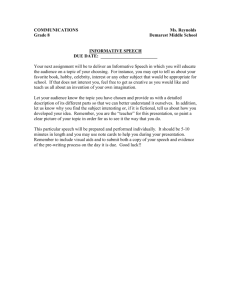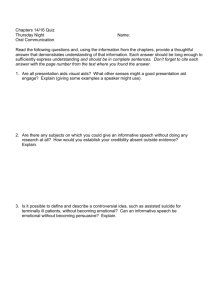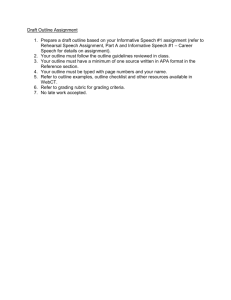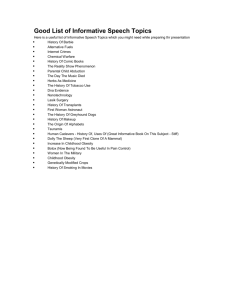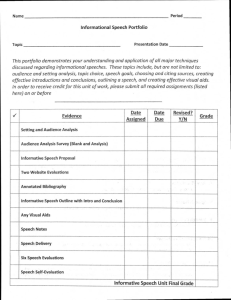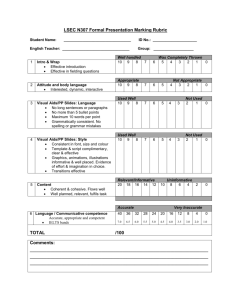The Speech to Inform Criteria
advertisement
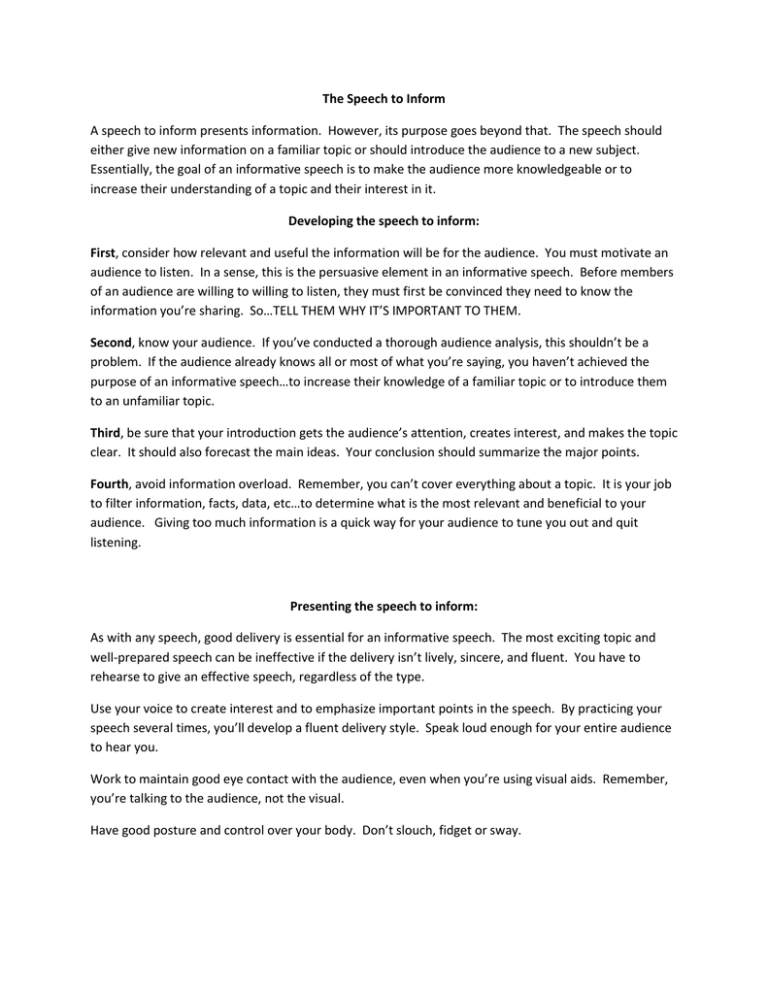
The Speech to Inform A speech to inform presents information. However, its purpose goes beyond that. The speech should either give new information on a familiar topic or should introduce the audience to a new subject. Essentially, the goal of an informative speech is to make the audience more knowledgeable or to increase their understanding of a topic and their interest in it. Developing the speech to inform: First, consider how relevant and useful the information will be for the audience. You must motivate an audience to listen. In a sense, this is the persuasive element in an informative speech. Before members of an audience are willing to willing to listen, they must first be convinced they need to know the information you’re sharing. So…TELL THEM WHY IT’S IMPORTANT TO THEM. Second, know your audience. If you’ve conducted a thorough audience analysis, this shouldn’t be a problem. If the audience already knows all or most of what you’re saying, you haven’t achieved the purpose of an informative speech…to increase their knowledge of a familiar topic or to introduce them to an unfamiliar topic. Third, be sure that your introduction gets the audience’s attention, creates interest, and makes the topic clear. It should also forecast the main ideas. Your conclusion should summarize the major points. Fourth, avoid information overload. Remember, you can’t cover everything about a topic. It is your job to filter information, facts, data, etc…to determine what is the most relevant and beneficial to your audience. Giving too much information is a quick way for your audience to tune you out and quit listening. Presenting the speech to inform: As with any speech, good delivery is essential for an informative speech. The most exciting topic and well-prepared speech can be ineffective if the delivery isn’t lively, sincere, and fluent. You have to rehearse to give an effective speech, regardless of the type. Use your voice to create interest and to emphasize important points in the speech. By practicing your speech several times, you’ll develop a fluent delivery style. Speak loud enough for your entire audience to hear you. Work to maintain good eye contact with the audience, even when you’re using visual aids. Remember, you’re talking to the audience, not the visual. Have good posture and control over your body. Don’t slouch, fidget or sway. Informative Speech Guidelines Due: Requirements: 1. 2. 3. 4. 5. 6. You must choose a topic that is related to environmental issues, conservation, or animals that are threatened or endangered, or have some sort of controversial issue surrounding them. You must have your topic approved by me on the first day and you may not change your topic after I have approved it. No two people may do the same topic. First come, first serve. Your speech must be 3 – 5 minutes in length. You may NOT read or use your written speech during your presentation. Give credit to the sources you use to gather information, data and/or quote. Put these sources at the end of your written paper. You must have a power point to accompany this presentation. It must be emailed to me or on a flash drive. On a flash drive is the preferred method. Refer to the notes on visual aids for the power point requirements. Grading: You will receive a MAJOR grade for your written speech. You will receive a MAJOR grade for your oral presentation. You will receive a MAJOR grade for your power point presentation. Each day we are in the computer lab you will receive daily grades for participation, staying on task, and completing the days objectives. Information that should be included in your speech: Animal: 1. General information about the animal: Specific information about where it lives, what it eats, its social habits (family structure, intelligence), etc… 2. Why the animal is threatened, endangered, or has a controversial issue surrounding them: be specific with details about how and why…give statistics and facts; explain the reasons. 3. What we can do to help the situation: Again, be specific…can we join an organization, write letters, spread the word, donate money to certain organizations, etc… Environmental: 1. 2. 3. Explain the specific problem and/or define it for us: ex: If you are giving a presentation on ozone depletion, explain and define ozone depletion and why it has become a problem. *Give specific details, facts, and statistics that support your topic.* Tell us why this topic is important to us…does it affect our health, our futures, etc…? What can we do to help correct this problem or concern? Recycle (where, how), buy less plastic, generate less waste, car pool, join organizations, etc…
